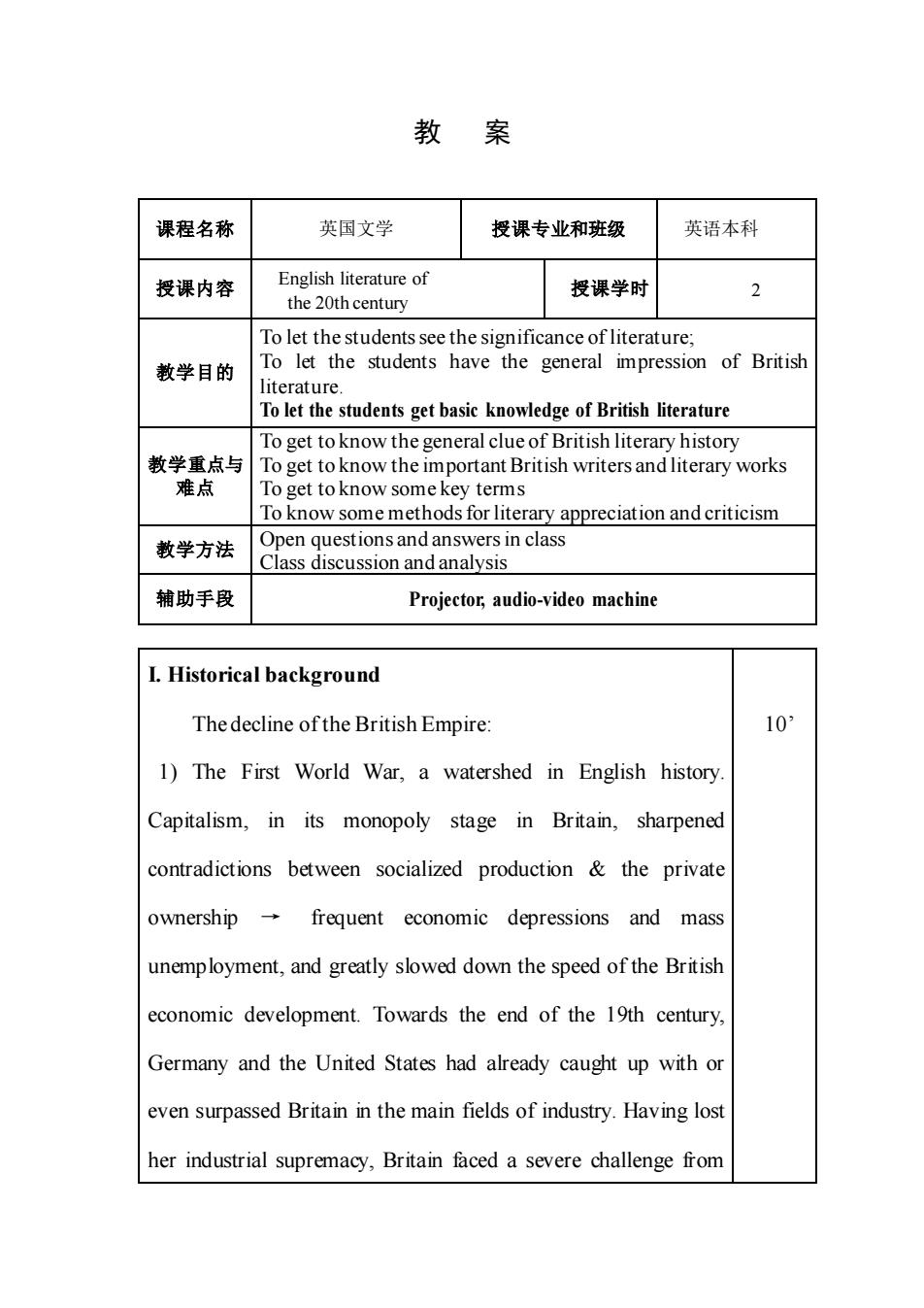
教案 课程名称 英国文学 授课专业和班级 英语本科 授课内容 English literature of 授课学时 the20thcentury To let the students see the significance of literature. 教学目的 To let the students have the general impression of British literature. To let the students get basic knowledge of British literature To get to know the general clue of British literary history 教学重点与To get to know the important British writers and literary works 难点 To get to know some key terms To know some methods for literary appreciation and criticism 教学方法 82emmnsnds 辅助手段 Projector,audio-video machine I.Historical background The decline ofthe British Empire: 10 1)The First World War,a watershed in English history Capitalism,in its monopoly stage in Britain,sharpened contradictions between socialized production the private ownership-frequent economic depressions and mass unemployment,and greatly slowed down the speed of the British economic development.Towards the end of the 19th century. Germany and the United States had already caught up with or even surpassed Britain in the main fields of industry.Having lost her industrial supremacy,Britain faced a severe challenge from
教 案 课程名称 英国文学 授课专业和班级 英语本科 授课内容 English literature of the 20th century 授课学时 2 教学目的 To let the students see the significance of literature; To let the students have the general impression of British literature. To let the students get basic knowledge of British literature 教学重点与 难点 To get to know the general clue of British literary history To get to know the important British writers and literary works To get to know some key terms To know some methods for literary appreciation and criticism 教学方法 Open questions and answers in class Class discussion and analysis 辅助手段 Projector, audio-video machine I. Historical background The decline of the British Empire: 1) The First World War, a watershed in English history. Capitalism, in its monopoly stage in Britain, sharpened contradictions between socialized production & the private ownership → frequent economic depressions and mass unemployment, and greatly slowed down the speed of the British economic development. Towards the end of the 19th century, Germany and the United States had already caught up with or even surpassed Britain in the main fields of industry. Having lost her industrial supremacy, Britain faced a severe challenge from 10’
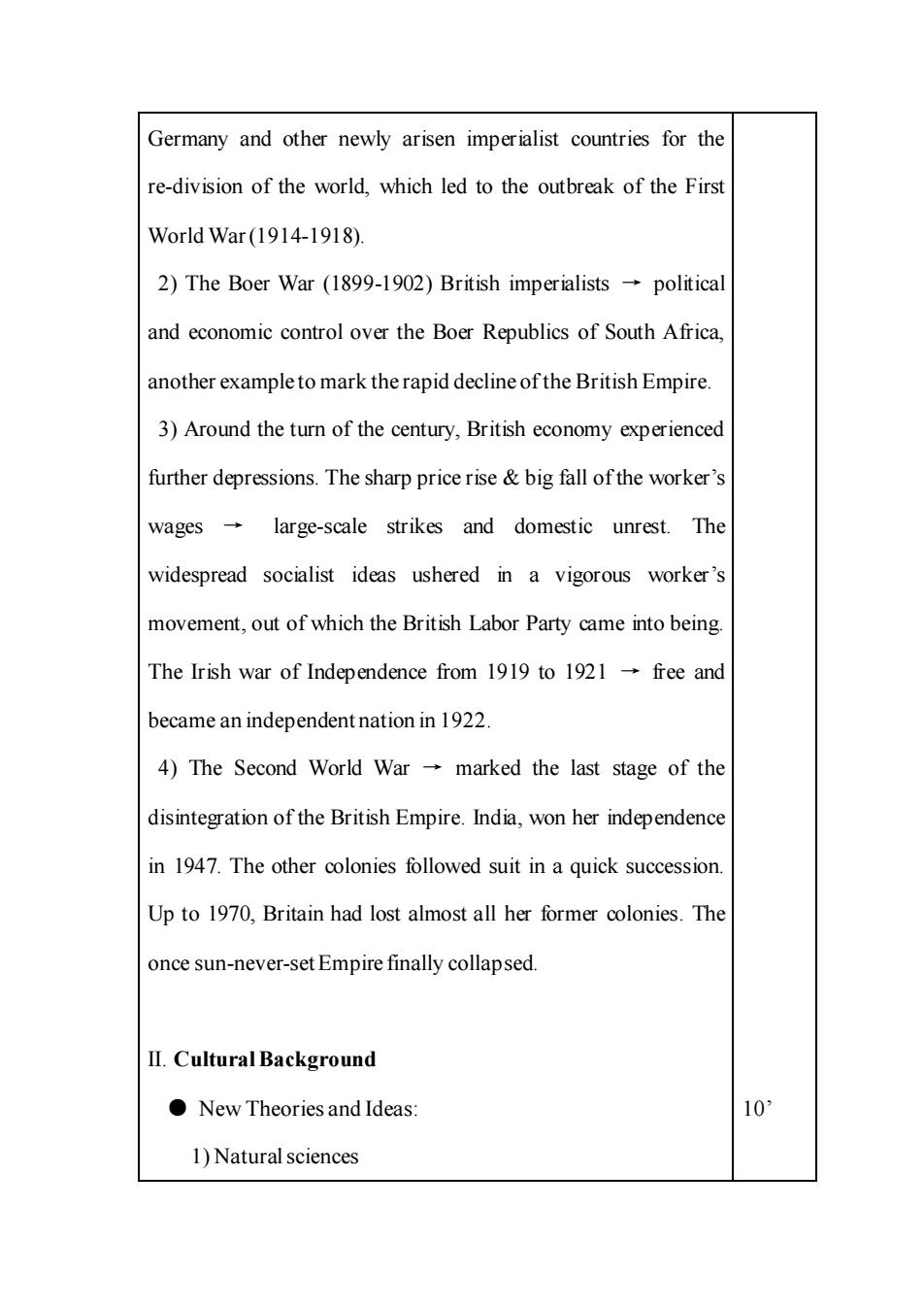
Germany and other newly arisen imperialist countries for the re-division of the world,which led to the outbreak of the First World War(1914-1918). 2)The Boer War(1899-1902)British imperialistspolitical and economic control over the Boer Republics of South Africa, another example to mark the rapid decline ofthe British Empire. 3)Around the turn of the century,British economy experienced further depressions.The sharp price rise big fall of the worker's wageslarge-scale strikes and domestic unrest.The widespread socialist ideas ushered in a vigorous worker's movement,out of which the British Labor Party came into being. The Irish war of Independence from 1919 to 1921-free and became an independent nation in 1922. 4)The Second World War-marked the last stage of the disintegration of the British Empire.India,won her independence in 1947.The other colonies followed suit in a quick succession. Up to 1970,Britain had lost almost all her former colonies.The once sun-never-set Empire finally collapsed. II.Cultural Background New Theories and Ideas: 10 1)Natural sciences
Germany and other newly arisen imperialist countries for the re-division of the world, which led to the outbreak of the First World War (1914-1918). 2) The Boer War (1899-1902) British imperialists → political and economic control over the Boer Republics of South Africa, another example to mark the rapid decline of the British Empire. 3) Around the turn of the century, British economy experienced further depressions. The sharp price rise & big fall of the worker’s wages → large-scale strikes and domestic unrest. The widespread socialist ideas ushered in a vigorous worker’s movement, out of which the British Labor Party came into being. The Irish war of Independence from 1919 to 1921 → free and became an independent nation in 1922. 4) The Second World War → marked the last stage of the disintegration of the British Empire. India, won her independence in 1947. The other colonies followed suit in a quick succession. Up to 1970, Britain had lost almost all her former colonies. The once sun-never-set Empire finally collapsed. II. Cultural Background ● New Theories and Ideas: 1) Natural sciences 10’
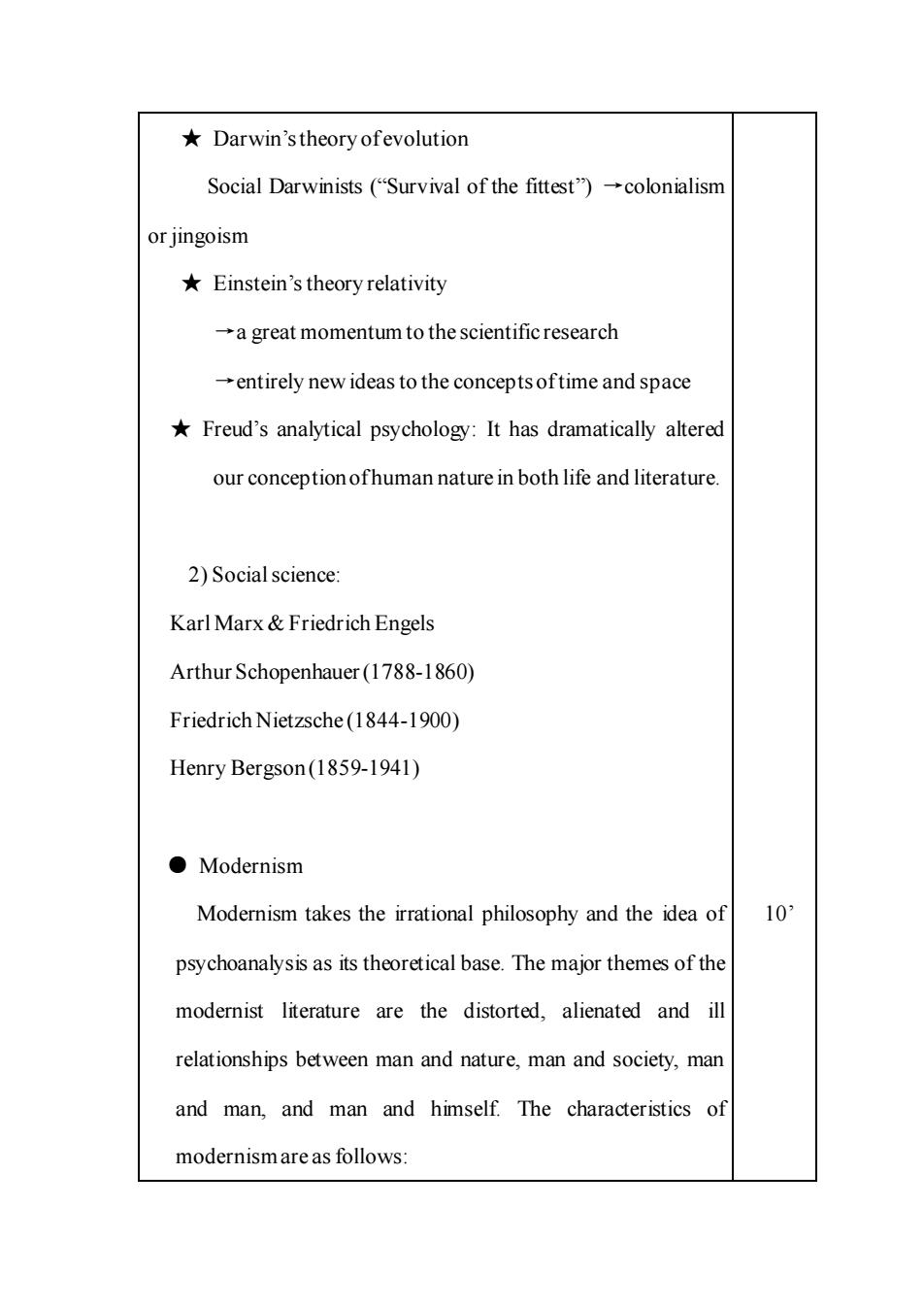
*Darwin'stheory ofevolution Social Darwinists("Survival of the fittest")colonialism or jingoism Einstein's theory relativity -a great momentum to the scientific research -entirely new ideas to the concepts oftime and space *Freud's analytical psychology:It has dramatically altered our conception ofhuman nature in both life and literature. 2)Social science: Karl Marx Friedrich Engels Arthur Schopenhauer(1788-1860) Friedrich Nietzsche(1844-1900) Henry Bergson(1859-1941) ●Modernism Modernism takes the irrational philosophy and the idea of l0: psychoanalysis as its theoretical base.The major themes of the modernist literature are the distorted,alienated and ill relationships between man and nature,man and society,man and man,and man and himself.The characteristics of modernismare as follows:
★ Darwin’s theory of evolution Social Darwinists (“Survival of the fittest”) →colonialism or jingoism ★ Einstein’stheory relativity →a great momentum to the scientific research →entirely new ideas to the concepts of time and space ★ Freud’s analytical psychology: It has dramatically altered our conception of human nature in both life and literature. 2) Social science: Karl Marx & Friedrich Engels Arthur Schopenhauer (1788-1860) Friedrich Nietzsche (1844-1900) Henry Bergson (1859-1941) ● Modernism Modernism takes the irrational philosophy and the idea of psychoanalysis as its theoretical base. The major themes of the modernist literature are the distorted, alienated and ill relationships between man and nature, man and society, man and man, and man and himself. The characteristics of modernism are as follows: 10’
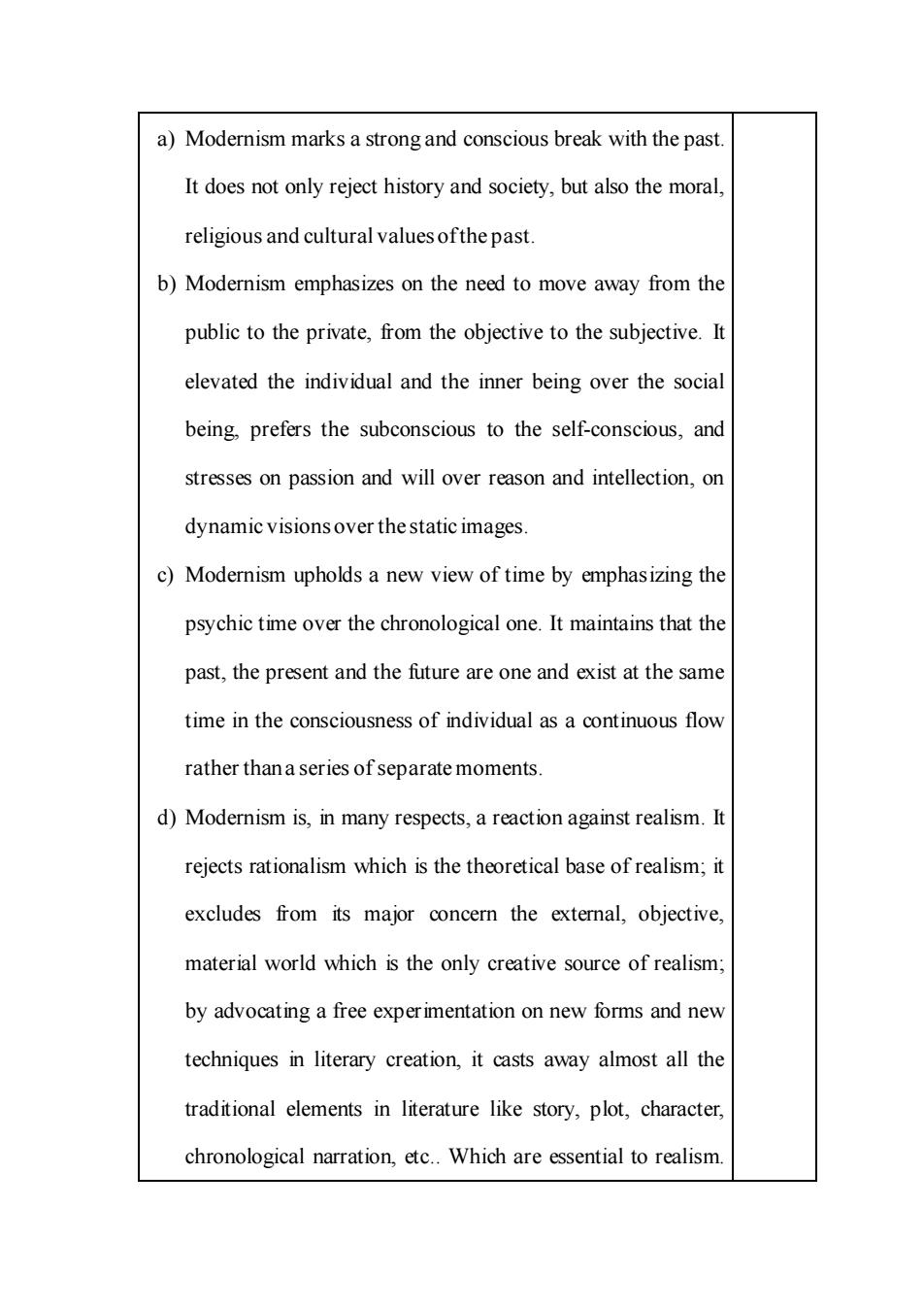
a)Modernism marks a strong and conscious break with the past It does not only reject history and society,but also the moral. religious and cultural values ofthe past. b)Modernism emphasizes on the need to move away from the public to the private,from the objective to the subjective.It elevated the individual and the inner being over the social being,prefers the subconscious to the self-conscious,and stresses on passion and will over reason and intellection,on dynamic visionsover thestatic images c)Modernism upholds a new view of time by emphasizing the psychic time over the chronological one.It maintains that the past,the present and the future are one and exist at the same time in the consciousness of individual as a continuous flow rather thana series of separate moments. d)Modernism is,in many respects,a reaction against realism.It rejects rationalism which is the theoretical base of realism;it excludes from its major concern the external,objective material world which is the only creative source of realism; by advocating a free experimentation on new forms and new techniques in literary creation,it casts away almost all the traditional elements in literature like story,plot,character, chronological narration,etc.Which are essential to realism
a) Modernism marks a strong and conscious break with the past. It does not only reject history and society, but also the moral, religious and cultural values of the past. b) Modernism emphasizes on the need to move away from the public to the private, from the objective to the subjective. It elevated the individual and the inner being over the social being, prefers the subconscious to the self-conscious, and stresses on passion and will over reason and intellection, on dynamic visions over the static images. c) Modernism upholds a new view of time by emphasizing the psychic time over the chronological one. It maintains that the past, the present and the future are one and exist at the same time in the consciousness of individual as a continuous flow rather than a series of separatemoments. d) Modernism is, in many respects, a reaction against realism. It rejects rationalism which is the theoretical base of realism; it excludes from its major concern the external, objective, material world which is the only creative source of realism; by advocating a free experimentation on new forms and new techniques in literary creation, it casts away almost all the traditional elements in literature like story, plot, character, chronological narration, etc. Which are essential to realism
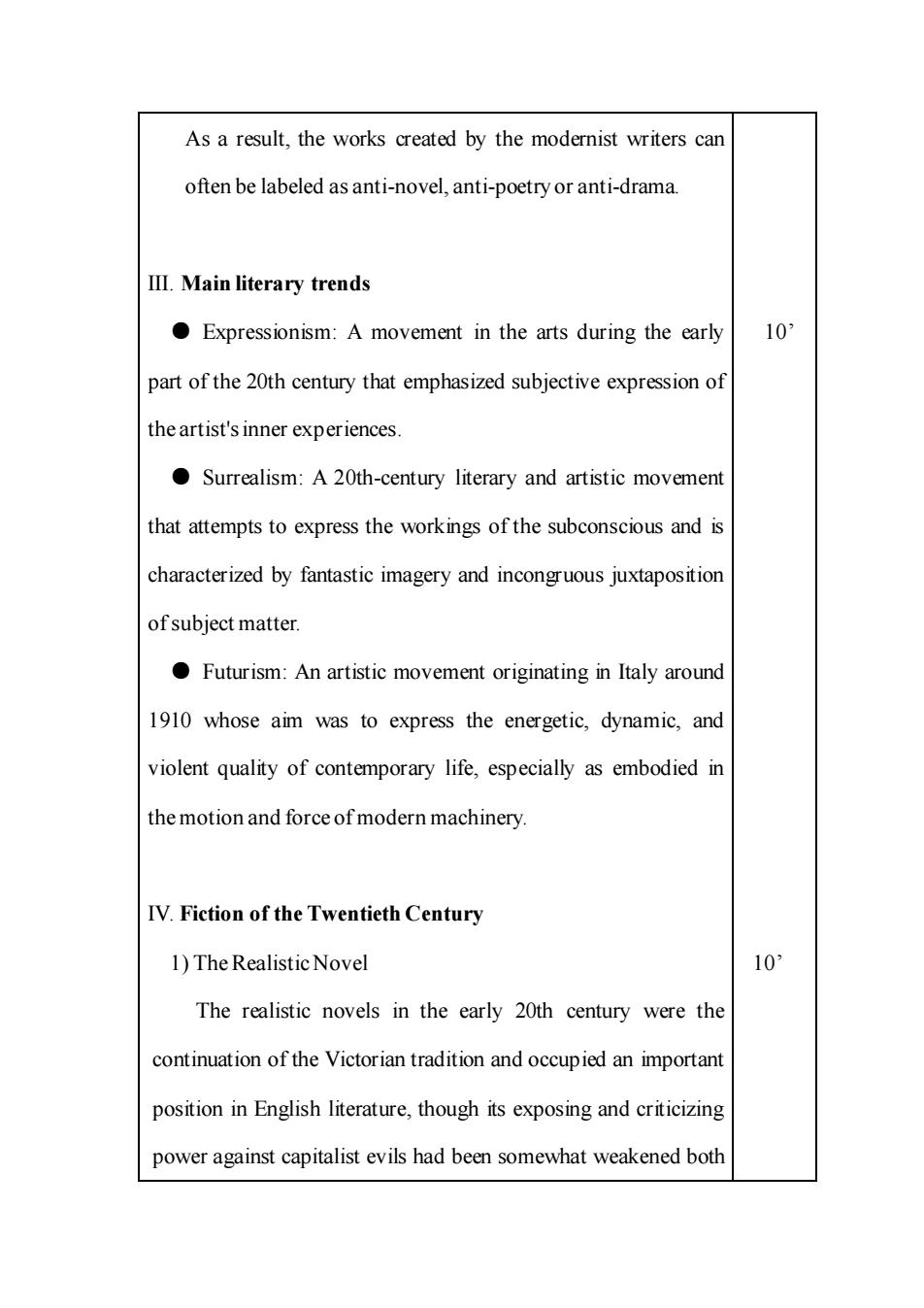
As a result,the works created by the modernist writers can often be labeled as anti-novel,anti-poetry or anti-drama. III.Main literary trends Expressionism:A movement in the arts during the early 10 part of the 20th century that emphasized subjective expression of the artist's inner experiences. Surrealism:A 20th-century literary and artistic movement that attempts to express the workings of the subconscious and is characterized by fantastic imagery and incongruous juxtaposition of subject matter. Futurism:An artistic movement originating in Italy around 1910 whose aim was to express the energetic,dynamic,and violent quality of contemporary life,especially as embodied in the motion and force of modern machinery. IV.Fiction of the Twentieth Century 1)The Realistic Novel 10 The realistic novels in the early 20th century were the continuation of the Victorian tradition and occupied an important position in English literature,though its exposing and criticizing power against capitalist evils had been somewhat weakened both
As a result, the works created by the modernist writers can often be labeled as anti-novel, anti-poetry or anti-drama. III. Main literary trends ● Expressionism: A movement in the arts during the early part of the 20th century that emphasized subjective expression of the artist's inner experiences. ● Surrealism: A 20th-century literary and artistic movement that attempts to express the workings of the subconscious and is characterized by fantastic imagery and incongruous juxtaposition of subject matter. ● Futurism: An artistic movement originating in Italy around 1910 whose aim was to express the energetic, dynamic, and violent quality of contemporary life, especially as embodied in the motion and force of modern machinery. IV. Fiction of the Twentieth Century 1) The Realistic Novel The realistic novels in the early 20th century were the continuation of the Victorian tradition and occupied an important position in English literature, though its exposing and criticizing power against capitalist evils had been somewhat weakened both 10’ 10’
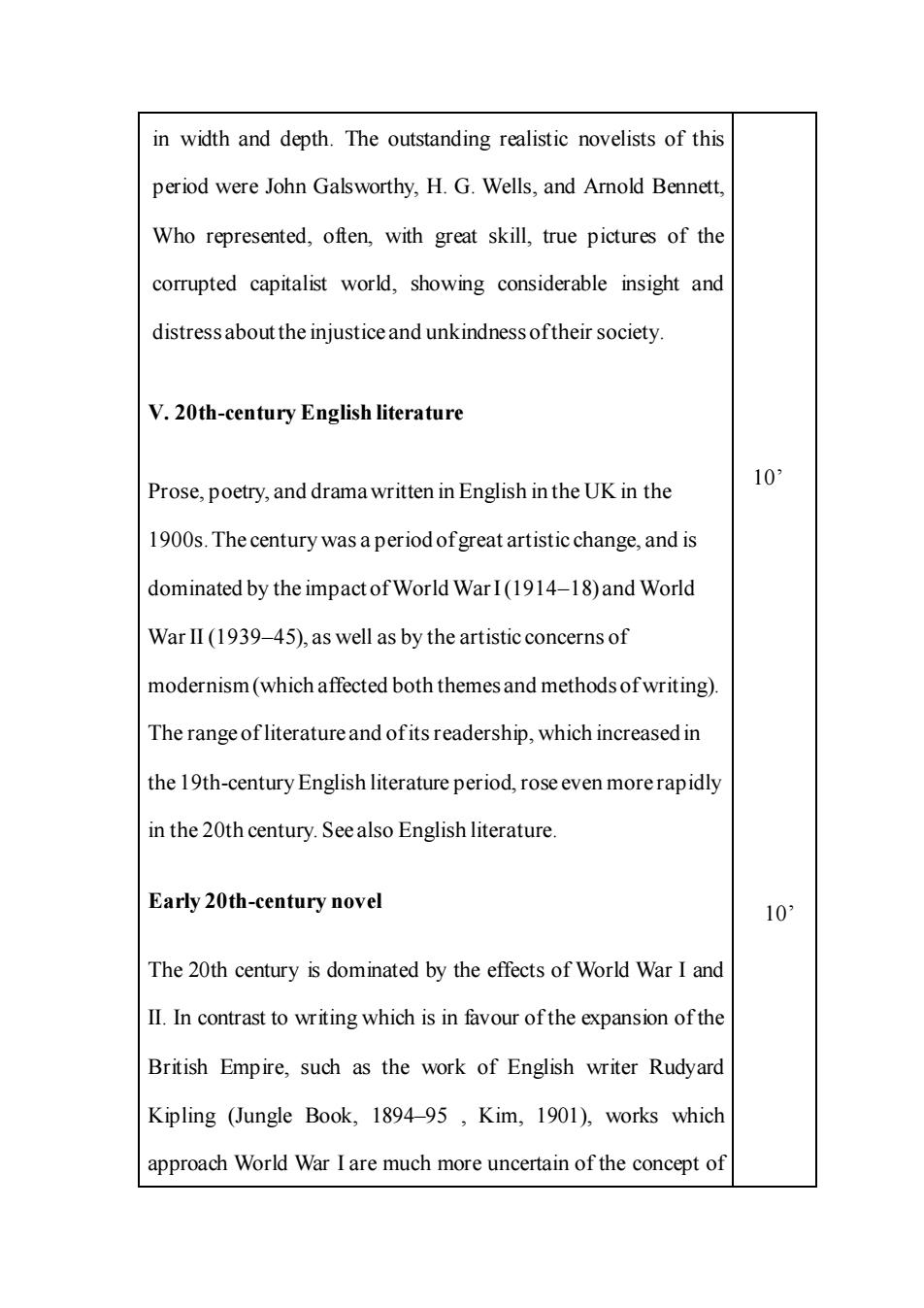
in width and depth.The outstanding realistic novelists of this period were John Galsworthy,H.G.Wells,and Arnold Bennett, Who represented,often,with great skill,true pictures of the corrupted capitalist world,showing considerable insight and distressabout the injustice and unkindness oftheir society. V.20th-century English literature Prose,poetry,and drama written in English in the UK in the 10 1900s.The century was aperiod ofgreat artistic change,and is dominated by the impact of World WarI(1914-18)and World War II(1939-45)as well as by the artistic concerns of modernism(which affected both themes and methods of writing) The range of literature and ofits readership,which increased in the 19th-century English literature period,rose even morerapidly in the 20th century.Seealso English literature. Early 20th-century novel 10° The 20th century is dominated by the effects of World War I and II.In contrast to writing which is in favour of the expansion of the British Empire,such as the work of English writer Rudyard Kipling (Jungle Book,1894-95,Kim,1901),works which approach World War I are much more uncertain of the concept of
in width and depth. The outstanding realistic novelists of this period were John Galsworthy, H. G. Wells, and Arnold Bennett, Who represented, often, with great skill, true pictures of the corrupted capitalist world, showing considerable insight and distress about the injustice and unkindness of their society. V. 20th-century English literature Prose, poetry, and dramawritten in English in the UK in the 1900s. The century was a period of great artistic change, and is dominated by the impact of World War I(1914–18) and World War II (1939–45), as well as by the artistic concerns of modernism(which affected both themes and methods of writing). The range of literature and of its readership, which increased in the 19th-century English literature period, rose even more rapidly in the 20th century. See also English literature. Early 20th-century novel The 20th century is dominated by the effects of World War I and II. In contrast to writing which is in favour of the expansion of the British Empire, such as the work of English writer Rudyard Kipling (Jungle Book, 1894–95 , Kim, 1901), works which approach World War I are much more uncertain of the concept of 10’ 10’

Britishness'or Englishness'(for example,the work of British novelist Joseph Conrad (Heart of Darkness,1902:Nostromo. 1904).This indicates the questioning nature of the 20th century which began by doubting the principles on which the Victorians had based their social code,leading to uncertainty and complexity.1894-95,Kim,1901),works which approach World War I are much more uncertain of the concept of Britishness'or 'Englishness'(for example,the work of British novelist Joseph Conrad (Heart of Darkness,1902;Nostromo,1904).This indicates the questioning nature of the 20th century,which began by doubting the principles on which the Victorians had based their social code,leading to uncertainty and complexity. Influential early 20th-century writers who mark the changing attitudes include Scottish writer John Buchan (The Thirty-Nine Steps,1915),whose work was concerned with the politics of World War I and the Boer War as well as English novelist John Galsworthy (Forsyte Saga 1906-22),who was more concerned with social than political change.The Clayhanger trilogy (1910-15),by English writer Arnold Bennett focuses on escape from the Victorian past English writer HG Wells,who practised science fiction at the end
‘Britishness’ or ‘Englishness’ (for example, the work of British novelist Joseph Conrad (Heart of Darkness, 1902; Nostromo, 1904). This indicates the questioning nature of the 20th century, which began by doubting the principles on which the Victorians had based their social code, leading to uncertainty and complexity. 1894–95 , Kim, 1901), works which approach World War I are much more uncertain of the concept of ‘Britishness’ or ‘Englishness’ (for example, the work of British novelist Joseph Conrad (Heart of Darkness, 1902; Nostromo, 1904). This indicates the questioning nature of the 20th century, which began by doubting the principles on which the Victorians had based their social code, leading to uncertainty and complexity. Influential early 20th-century writers who mark the changing attitudes include Scottish writer John Buchan (The Thirty-Nine Steps, 1915), whose work was concerned with the politics of World War I and the Boer War as well as English novelist John Galsworthy (Forsyte Saga, 1906–22), who was more concerned with social than political change. The Clayhanger trilogy (1910–15), by English writer Arnold Bennett focuses on escape from the Victorian past. English writer H G Wells, who practised science fiction at the end
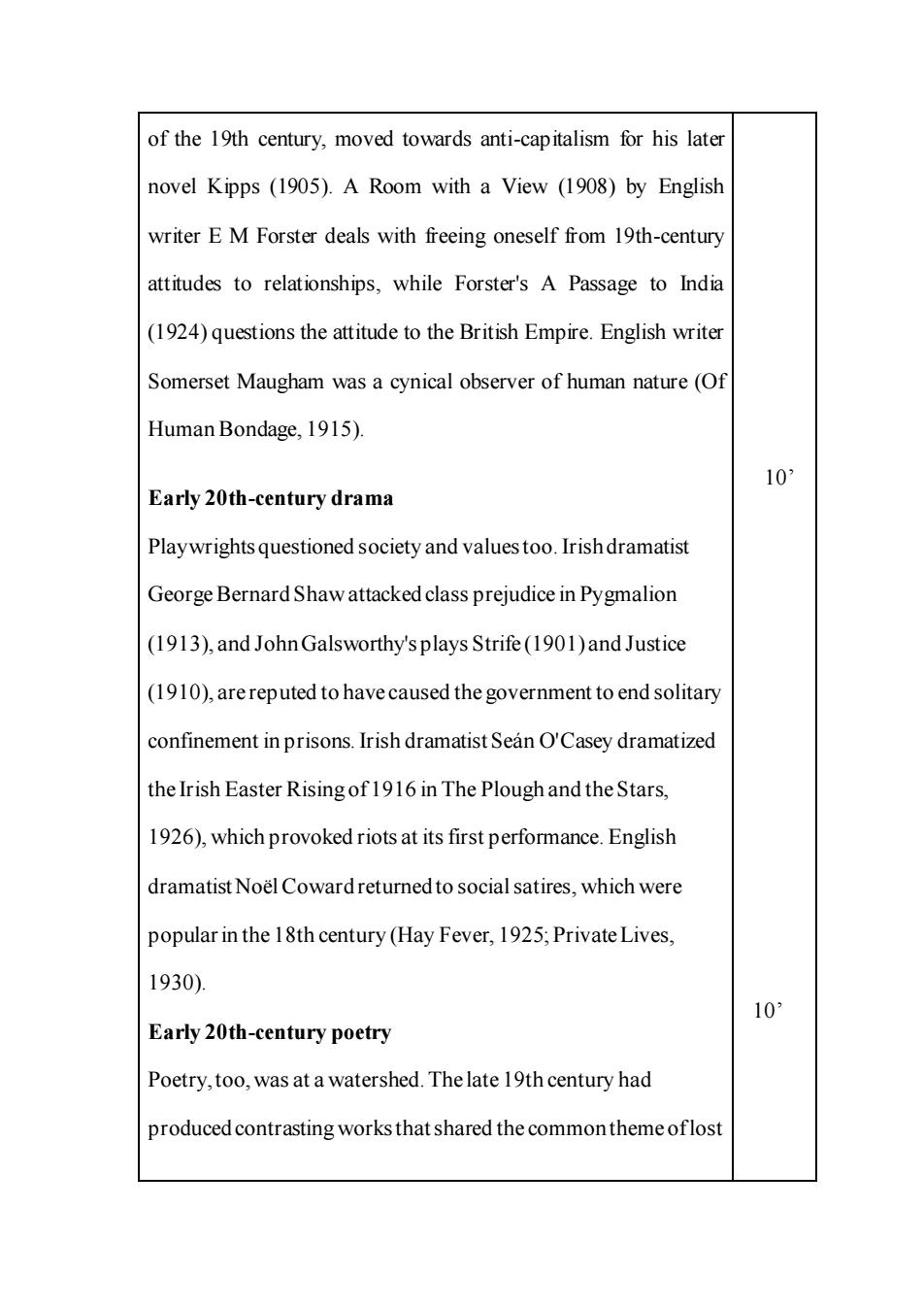
of the 19th century,moved towards anti-capitalism for his later novel Kipps (1905).A Room with a View (1908)by English writer E M Forster deals with freeing oneself from 19th-century attitudes to relationships,while Forster's A Passage to India (1924)questions the attitude to the British Empire.English writer Somerset Maugham was a cynical observer of human nature(Of Human Bondage,1915). Early 20th-century drama 10 Playwrights questioned society and valuestoo.Irishdramatist George Bernard Shaw attacked class prejudice in Pygmalion (1913),and John Galsworthy's plays Strife(1901)and Justice (1910),arereputed to havecaused the government to end solitary confinement in prisons.Irish dramatist Sean O'Casey dramatized the Irish Easter Rising of 1916 in The Plough and the Stars, 1926),which provoked riots at its first performance.English dramatist Noel Coward returned to social satires,which were popular in the 18th century (Hay Fever,1925;Private Lives, 1930). 10 Early 20th-century poetry Poetry,too,was at a watershed.The late 19th century had produced contrasting works that shared the commontheme oflost
of the 19th century, moved towards anti-capitalism for his later novel Kipps (1905). A Room with a View (1908) by English writer E M Forster deals with freeing oneself from 19th-century attitudes to relationships, while Forster's A Passage to India (1924) questions the attitude to the British Empire. English writer Somerset Maugham was a cynical observer of human nature (Of Human Bondage, 1915). Early 20th-century drama Playwrights questioned society and values too. Irish dramatist George Bernard Shaw attacked class prejudice in Pygmalion (1913), and John Galsworthy's plays Strife (1901) and Justice (1910), are reputed to have caused the government to end solitary confinement in prisons. Irish dramatist Seán O'Casey dramatized the Irish Easter Rising of 1916 in The Plough and the Stars, 1926), which provoked riots at its first performance. English dramatist Noël Coward returned to social satires, which were popular in the 18th century (Hay Fever, 1925; Private Lives, 1930). Early 20th-century poetry Poetry, too, was at a watershed. The late 19th century had produced contrasting works that shared the common theme of lost 10’ 10’

illusions,including Irish writer Oscar Wilde's'The Ballad of Reading Gaol'(1898).The Farmer's Bride'(1915)by English poet Charlotte Mew also deals with unfulfilled hopes and English writer Thomas Hardy wrote ofa sense of gathering gloom in his poem 'The Darkling Thrush'(1901).Irish poetand playwright W B Yeats is concerned with the realities of Irish politics(Easter 1916'),as well as with Irish mythology and mystic symbolism. Yeats survived the 1916Irish Easter Risingand World War I but many poets did not,and there is a great deal of poetry that came out of the war.These include the war sonnets(1914)ofEnglish poet Rupert Brooke(killed in 1915)and the workofEnglish poet Wilfred Owen.The war poetry has cometo sum up the catastrophe,needless waste and destruction ofhumanity in 20th-century warfare.Most ofOwen's poems were published posthumously,and werecollected and edited by English poet Siegfried Sassoon('Counter-Attack',1918),who survived the war.Compared to this the work ofEnglish poets John Masefield and Walter de la Mare seems less modern,but their lyrical quality has led to their continuing popularity. 10: VI.Post-war women's writing After the success of Virginia Woolf,and after the two world wars it appeared easier thanever before for women to be published in a
illusions, including Irish writer Oscar Wilde's ‘The Ballad of Reading Gaol’ (1898). ‘The Farmer's Bride’ (1915) by English poet Charlotte Mew also deals with unfulfilled hopes and English writer Thomas Hardywrote of a sense of gathering gloom in his poem ‘The Darkling Thrush’ (1901). Irish poet and playwright W B Yeatsis concerned with the realities of Irish politics (‘Easter 1916’), as well as with Irish mythology and mystic symbolism. Yeats survived the 1916 Irish Easter Rising and World War I but many poets did not, and there is a great deal of poetry that came out of the war. These include the war sonnets (1914) of English poet Rupert Brooke (killed in 1915) and the work of English poet Wilfred Owen. The war poetry has come to sum up the catastrophe, needless waste and destruction of humanity in 20th-century warfare. Most of Owen's poems were published posthumously, and were collected and edited by English poet Siegfried Sassoon (‘Counter-Attack’, 1918), who survived the war. Compared to this the work of English poets John Masefield and Walter de la Mare seems less modern, but their lyrical quality has led to their continuing popularity. VI. Post-war women's writing After the success of Virginia Woolf, and after the two world wars, it appeared easier than ever before for women to be published in a 10’

traditionally male literary industry.English writers Margaret Drabble(The Millstone,1965),Elizabeth Jane Howard (The Beautiful Visit,1950),Iris Murdoch(The Sea,The Sea,1978; Booker Prize),Doris Lessing(Children of Violence,1952-69) Fay Weldon(The Life and Loves of a She-Devil,1984),and Scottish writer Muriel Spark(The Prime of Miss Jean Brodie. 1961),have written shrewd and observant pictures of contemporary life and women's changingroles within it.English writer Angela Carter was an exponent ofmagic realism(Nights at the Circus,1984),and English writer Jeanette Winterson has been influential in writingabout female sexuality(Oranges Are Not the Only Fruit,1985). Post-war drama Drama ofthe period is equally diverse,taking in the work of English dramatists Terence Rattigan(The Winslow Boy,1946), Christopher Fry(the verse drama The Lady's not for Burning, 1950)and the Theatre ofthe Absurd school(see Absurd,Theatre (100) of the),including the work of Samuel Beckett(Waiting for Godot. English version 1955;Endgame,1957).Englishdramatist John Arden wrote socialand political dramas(Live Like Pigs,1958 Serjeant Musgrave's Dance,1959),which were contemporary with the distinct genre of kitchen sink dramas,by writers
traditionally male literary industry. English writers Margaret Drabble (The Millstone, 1965), Elizabeth Jane Howard (The Beautiful Visit, 1950), Iris Murdoch (The Sea, The Sea, 1978; Booker Prize), Doris Lessing (Children of Violence, 1952–69), Fay Weldon (The Life and Loves of a She-Devil, 1984), and Scottish writer Muriel Spark (The Prime of Miss Jean Brodie, 1961), have written shrewd and observant pictures of contemporary life and women's changing roles within it. English writer Angela Carterwas an exponent of magic realism (Nights at the Circus, 1984), and English writer Jeanette Winterson has been influential in writing about female sexuality (Oranges Are Not the Only Fruit, 1985). Post-war drama Drama of the period is equally diverse, taking in the work of English dramatists Terence Rattigan (The Winslow Boy, 1946), Christopher Fry (the verse drama The Lady's not for Burning, 1950) and the Theatre of the Absurd school (see Absurd, Theatre of the), including the work of Samuel Beckett (Waiting for Godot, English version 1955; Endgame, 1957). English dramatist John Arden wrote social and political dramas (Live Like Pigs, 1958; Serjeant Musgrave's Dance, 1959), which were contemporary with the distinct genre of kitchen sink dramas, by writers (100’)